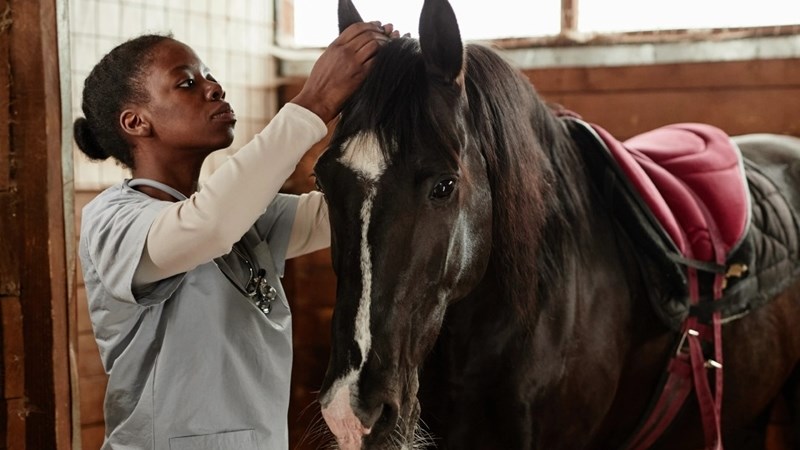Agriculture
Para-professional training to address vet shortage─── ELZETTE BOUCHER 05:00 Mon, 04 Dec 2023

Stakeholders are planning to address South Africa’s veterinary skills shortage by focussing on training more para-professionals in the sector.
A recent round table on transforming the veterinary sector in South Africa has concluded that to address animal health and prevent outbreaks of disease, like the recent avian influenza, more para-professionals in the veterinary sector need to be trained to service especially in rural areas.
This is according to Dr Nomsa Mnisi, the board chairperson of the Health and Welfare Sector Education Training Authority (HWSETA), who along with the Deputy Minister of Higher Education, Science, and Innovation, Buti Manamela, and various other stakeholders engaged on how to address the skills shortage at the University of Pretoria’s Onderstepoort facility on 27 November 2023.
Mnisi, who is also a veterinarian, further explained that most vets work with smaller animals like pets in urban areas like cities.
“We need professionals that will be taking care of the needs of South Africa, the need being livestock. We realised that we do not only need veterinarians, we also need para-veterinary professionals – animal health technicians, who are there daily doing the inspections, vaccinations, surveillance, everything to keep livestock healthy.”
She added that the services of a veterinarian are expensive but a para-veterinarian is more cost-effective. Therefore establishing more facilities to enable the training of these professionals is needed.
The first Vet Sector Roundtable discussions, focusing on innovation, inclusivity, and excellence in the veterinary sector, took place on 27 November 2023. Photo: HWSETA
As South Africa’s singular training facility, the University of Pretoria can no longer meet the country’s demands for producing veterinarians.
“The Department of Higher Education has had on the table the establishment of a second faculty. Now the veterinary sector is assisting so that we can get this moving,” said Mnisi.
The way forward
According to Mnisi, four universities have already shown interest in filling this gap, namely the North West University, University of the Free State, Fort Hare and Sefako Makgatho Health Sciences University.
Once the second faculty has been established, the need will be reassessed and more facilities rolled out if required.
“It’s not a single faculty or single building. We’ll be looking broader because South Africa is broad.”
The participants of the round table will be meeting quarterly to track the progress of this project.
In 2022, a learner awareness campaign was also launched to encourage young people to take the school subjects needed to enrol for tertiary studies in veterinary sciences.
It takes six years to qualify as a veterinarian and three years to qualify as a veterinary nurse. To enrol, a National Senior Certificate with a Bachelor’s Degree pass and competency in English, Mathematics, Physical Sciences and Life Sciences are required.
Veterinary skills remain rare in South Africa
Meanwhile, statistics from the South African Veterinary Council (SAVC) show the country has 60 to 70 vets per million citizens, far below the international norm of 200 to 400 vets per million.
This scarcity extends beyond veterinarians and encompasses para-veterinary professionals, emphasising the urgent need for a diverse array of skilled individuals. These include: veterinary nurses, animal health technicians, and veterinary technologists.
In October 2023, the Department of Home Affairs gazetted a revised critical skills list for South Africa, to include veterinarians and veterinary nurses.
The list was updated in 2022 for the first time since 2014 as part of the government’s drive to draw skilled professionals to South Africa to address the local skills shortage.
In May, SAVC indicated that they along with the Department of Agriculture, Land Reform and Rural Development, were engaging with Home Affairs to reinstate veterinary professionals as they were dropped from the critical skills list in 2022.
SAVC president Dr Nandipha Ndudane also warned potential crises in animal health and food safety and security loomed due to the shortage of veterinarians.
“Our records show that we are losing up to 150 vets a year to emigration… (and) a fifth of young vets aged 25 to 29 polled intended to emigrate,” said Ndudane in a statement.
“Something urgently needs to be done to stem the exodus of these highly qualified and sought-after professionals, provide more tertiary training opportunities for vets in South Africa, and make it easier for foreign vets and foreign South African-qualified students to practise here.”
A greater need in the informal agriculture sector
In March, a survey conducted by SAVC and Marketing Surveys and Statistical Analysis funded by HWSETA indicated that 90% of commercial farmers highly respect veterinarians, with 88% saying they have a good relationship with vets and seek their advice. Most commercial farmers surveyed also believed that vets play an important role in ensuring food security and curbing zoonotic diseases.
The research found that more than 80% of commercial farmers have livestock. It’s estimated that commercial farmers in South Africa own 7.2 million cattle and 13.6 million sheep. However, while 71% of respondents had easy access to veterinary services in their area, most farmers treated their animals themselves – unless there was an emergency. They were generally well-informed about animal diseases and had sufficient access to livestock remedies and scheduled medicines.
The insights from emerging and small-scale farmers, however, painted a different picture. The study estimated that as much as South Africa is home to 13.1 million cattle and 19.7 million sheep, roughly a third of which (5.9 million cattle and 6.1 million sheep) were owned by emerging and small-scale farmers.
Veterinary clinics were used by only 25% of the sample. One of the biggest challenges facing up-and-coming and small-scale farmers was their lack of agricultural training, the survey found, with more than three-quarters of respondents expressing a need for more education in this regard.















